The King Holiday
In honor of Dr. Martin Luther King, Jr., we will not publish on Monday. We'll see you all again on Tuesday morning, January 20.
In honor of Dr. Martin Luther King, Jr., we will not publish on Monday. We'll see you all again on Tuesday morning, January 20.
 The tax deal Luxembourg gave Amazon in 2003 that has allowed it to pay much lower taxes on its European operations than otherwise expected appears to amount to "unfair state aid," the European Union's antitrust office said in a preliminary finding.
The tax deal Luxembourg gave Amazon in 2003 that has allowed it to pay much lower taxes on its European operations than otherwise expected appears to amount to "unfair state aid," the European Union's antitrust office said in a preliminary finding.
In a 23-page letter released publicly (and quoted by the New York Times), the antitrust office said that through the deal, "the Luxembourgish authorities confer an advantage on Amazon." That "advantage is obtained every year and ongoing [and] is also granted in a selective manner."
In a statement, Amazon denied that it has received any special tax treatment.
The Wall Street Journal said that the method Luxembourg uses to calculate Amazon's taxes doesn't "appear to comply with international guidelines. Amazon's European head office, Amazon EU Sarl, is based in Luxembourg and had net revenue of €13.6 billion ($15.82 billion) in 2013."
The Journal added: "At issue are the prices that multinational companies charge for goods or services sold by one subsidiary to another, known as transfer-pricing arrangements. These could be manipulated to allow companies to shift profits away from high-tax jurisdictions, so international guidelines require that they be determined at 'arm's length,' reflecting transactions that would take place between independent companies.
"The commission questioned an internal royalty fee paid by Amazon EU Sarl to another Luxembourg subsidiary of Amazon, which has the effect of reducing Amazon's tax liabilities. The royalty is paid for the use of intellectual property, but 'is not related to output, sales, or to profit,' the regulator said."
The office's investigation of Amazon's Luxembourg tax deal is part of an investigation into tax-avoidance arrangements with several multinational companies, including Starbucks, Apple and Fiat. The investigations may result in the companies having to pay higher taxes both retroactively and in the future.
The Times noted: "It is not illegal in the European Union to try to lure businesses with low tax rates. But offering special deals to companies that are not available to their competitors can amount to illegal state aid."
The investigation was formally announced last October. At the heart of the matter is a "comfort letter" issued by Luxembourg that capped Amazon's taxes in the country, effectively limiting them to less than 1% of Amazon's European income.
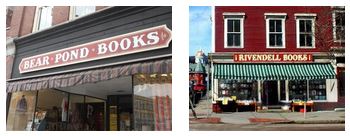
"The business of bookselling is changing," said co-owner Claire Benedict, who operates Bear Pond while her husband, Rob Kasow, runs Rivendell. "We needed to make decisions that ensure we can continue to have a strong, independent bookstore presence in downtown Montpelier. In this case, that means being able to offer more choice in one location."
Benedict and Kasow have owned Rivendell Books since 2002, and purchased Bear Pond from Michael Katzenberg in 2006.
Books-A-Million will open a new store in a 4,500-square-foot space at the Mercer Mall in Bluefield, West Va., as early as next month, the Bluefield Daily Telegraph reported.
"Books-A-Million just contacted the chamber of commerce to do a ribbon cutting in February," said mall general manager Dennis McAlister, adding: "We've been trying to find a bookstore ever since Borders went out.... It is just a great move for the mall to have a book store."
 "I was very encouraged in this last holiday period to see independents [bookstores] grow quite significantly over the previous year," said HarperCollins president and CEO Brian Murray during a discussion with Mike Shatzkin, founder of the Idea Logical Company, on the final day of Digital Book World yesterday in New York City. "We want there to be as much choice for readers as possible."
"I was very encouraged in this last holiday period to see independents [bookstores] grow quite significantly over the previous year," said HarperCollins president and CEO Brian Murray during a discussion with Mike Shatzkin, founder of the Idea Logical Company, on the final day of Digital Book World yesterday in New York City. "We want there to be as much choice for readers as possible."
The reiteration of support for independent bookstores came after Shatzkin asked how HarperCollins intends to navigate a retail landscape that is dominated primarily by Amazon in the digital realm and Barnes & Noble in the physical. Murray acknowledged that although the big intermediaries are very efficient and have their own benefits, it is in his company's best interest to have viability in as many different retail channels as possible.
 |
|
| Brian Murray | |
"Having a choice, having local bookstores, is critically important to us, and more largely to all the communities they serve," added Murray.
According to Murray, one of the keys to HarperCollins's support of indies is "constantly talking" to indie booksellers and seeking their feedback. Last year's expedited shipping for indies during the holidays, he said, came in part from those talks. HarperCollins, he continued, would work hard to support independent bookstores throughout 2015 and beyond.
On the topic of the Amazon-Hachette standoff, Murray said he'd felt frustrated by some of the dialogue that had emerged over the last year, particularly when it became a perceived battle between self-published authors and those traditionally published.
"I think self-publishing is terrific. Anytime there're more choices for any group it's terrific," he maintained. But, he added, HarperCollins is "not in the self-publishing business... we're a high-service, high-cost publishing model."
---
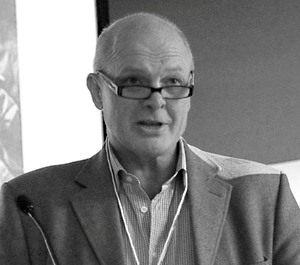 |
|
| Jonathan Nowell | |
In a later presentation, Jonathan Nowell, president of Nielsen Book, discussed how the print book market has changed since the rise of e-books. Print book sales, he said, peaked in the United States in 2009 at 770 million units sold; by comparison, in 2014, 635 million units were sold. In the print market, things have shifted away from adult fiction and towards nonfiction and juvenile. Despite all manner of commentators predicting "the demise of the hardback," hardcover sales have actually held up well. It's the "cheaper, soft-back sisters," Nowell said, that have been cannibalized by e-book sales.
While adult fiction sales are moving more to the digital realm, especially in the fantasy, sci-fi and romance genres (a quarter of all fiction titles sold as e-books are classified as romance, Nowell said), juvenile sales have grown hugely over the last few years--and almost entirely in print. Things are a bit more varied when it comes to print nonfiction: sales of some categories, such as travel guides and reference books, have plummeted, while others, like religious titles and cookbooks, have risen.
As part of his presentation, Nowell also discussed his ideas for the "bookshop of the future." It would be, he said, physical by day, virtual by night, beautiful to explore and fun. The prototype he pointed to was Foyles new flagship store in London, England.
---
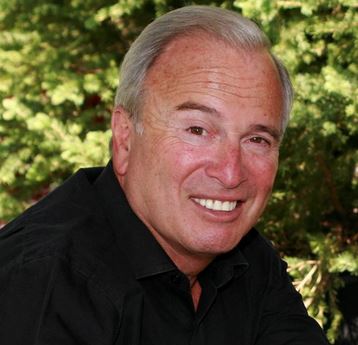 |
|
| Ken Auletta | |
Ken Auletta, a staff-writer for the New Yorker and the author of Googled: The End of the World As We Know It, discussed how publishers can survive in a marketplace that is now dominated by companies with the disruptive tendencies and tenacity of software engineers. One of Amazon's guiding notions since it entered the book business, Auletta asserted, was the desire to eliminate what they deemed to be "superfluous middlemen" between authors and readers. Included in that category were both existing bookstores and traditional publishers.
"But where Amazon I think is wrong is [in believing] that by definition publishers are extraneous," said Auletta. And in its "steamrolling" of the book business, he added, Amazon's engineers failed to recognize the "joy of browsing" and serendipity that bookstores provide.
---
According to Keith Moerer, the director of Apple's iBooks store, iBooks has been averaging a million new customers per week since mid-September. The single biggest reason for that growth, he said, is that since the release of iOS 8, iBooks is now pre-installed on Apple products. Before iOS 8, users would have to download iBooks from the App Store separately.
--Alex Mutter
HarperCollins and Harlequin, which HarperCollins bought last year, are reorganizing sales: Harlequin salespeople will sell mass market titles (from both Harlequin and HarperCollins/Avon) in key mass merchant accounts, while HarperCollins sales staff will sell mass market titles to trade/direct accounts, with some exceptions. All hardcover and trade paperback titles will be sold to all channels by the HarperCollins sales staff.
The change takes place in the mass merchant channel beginning February 1 and will be followed by the trade channels. All changes will be completed by June 30. Basic sales operations (including order processing, shipping, and returns) will continue to operate as they do now: separately and without significant immediate changes.
"This new strategy will allow us to leverage the strengths of two terrific, and complementary sales organizations," said Josh Marwell, HarperCollins president of sales. "Together we will create new opportunities for growth in sales and exposure of our authors' books."
Alex Osuszek, v-p of retail sales at Harlequin, said, "Harlequin will continue to maintain our strong selling relationships in the mass market retail channel while gaining the opportunity to build our hardcover and trade sales through the strength of the HarperCollins sales team."

"We're delighted to bring Simon & Schuster books to this exciting new shopping destination,” said Michael Selleck, executive v-p, sales & marketing at the publisher. "We think 11 Main shoppers will be pleased to find this highly-curated collection of some of our most well-regarded and popular books, offered at competitive prices and easily discovered alongside the many other unique products and shops on the site."
---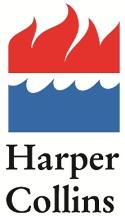 HarperCollins has launched a pilot program offering previews of top-selling books to Web and social network users on both mobile and desktop devices via Aerbook. Socially optimized excerpts can be shared on Twitter, Facebook, Pinterest or any other network. These can be expanded so users can read an extended sample that includes a built-in buy button, social sharing and an e-mail opt-in for special offers and announcements.
HarperCollins has launched a pilot program offering previews of top-selling books to Web and social network users on both mobile and desktop devices via Aerbook. Socially optimized excerpts can be shared on Twitter, Facebook, Pinterest or any other network. These can be expanded so users can read an extended sample that includes a built-in buy button, social sharing and an e-mail opt-in for special offers and announcements.
Chantal Restivo-Alessi, chief digital officer at HarperCollin, said, "This is another step forward in trying new ways to engage readers and expand the reach of our authors."
Diana Gerald has been appointed CEO of Booktrust, the independent British charitable organization with a goal of encouraging people to engage with books, the Bookseller reported. Gerald, who succeeds Viv Bird and will take up the position in March, joins Booktrust from education charity Ark Schools, where she was COO.
"Diana is dynamic, ambitious and passionate about reading and the life-changing benefits it brings," said Karen Brown, chair of Booktrust's board of trustees. "She brings great leadership and management experience having worked across commercial, non-profit and social enterprise organizations.
Jacqueline Briskin, who wrote California Generation and other bestselling novels that sold more than 20 million copies worldwide, died December 24, the Los Angeles Times reported. She was 87. Three of Briskin's books--Everything and More, Too Much Too Soon and Dreams Are Not Enough--were released by Penguin earlier this week as e-books for the first time.
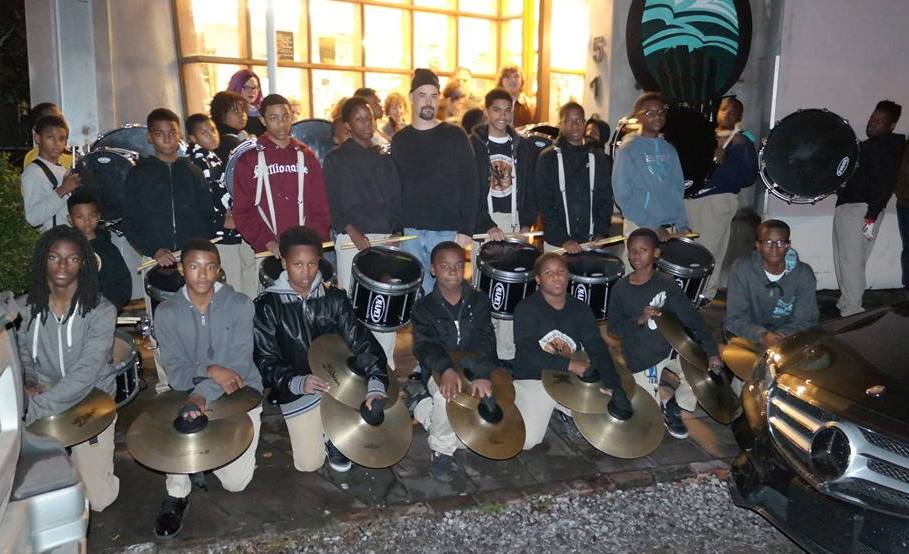 Author Bill Loehfelm visited Octavia Books in New Orleans Thursday night for Doing the Devil's Work (Sarah Crichton Books), his third mystery featuring New Orleans cop Maureen Coughlin. Octavia is donating 20% of the book's sales to The Roots of Music, a local youth organization (Loehfelm mentions the group in his book). A group of Roots percussionists performed before Loehfelm's reading.
Author Bill Loehfelm visited Octavia Books in New Orleans Thursday night for Doing the Devil's Work (Sarah Crichton Books), his third mystery featuring New Orleans cop Maureen Coughlin. Octavia is donating 20% of the book's sales to The Roots of Music, a local youth organization (Loehfelm mentions the group in his book). A group of Roots percussionists performed before Loehfelm's reading.
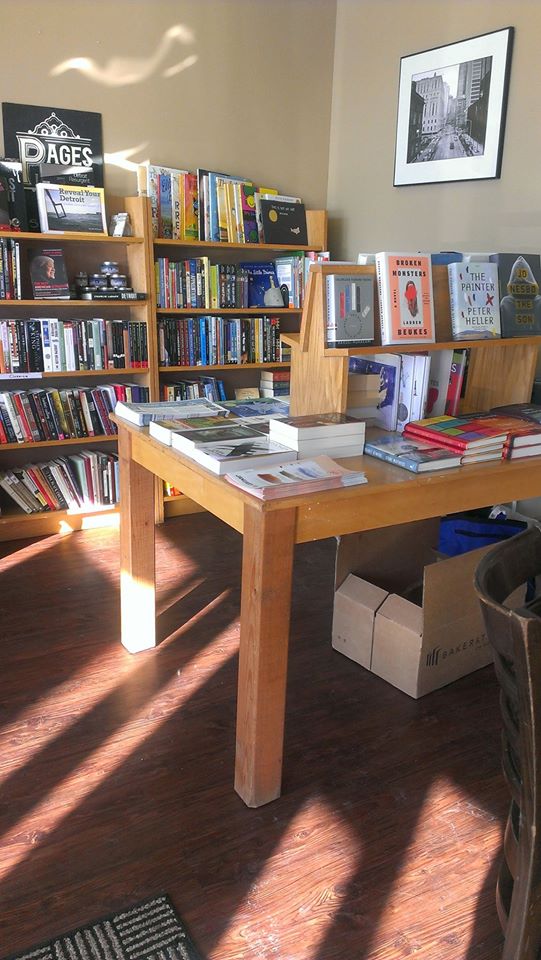 Susan Murphy, who is hoping she will "find a permanent home this year" for Pages Bookshop in Detroit, has opened a pop-up version of her bookshop in Always Brewing Detroit coffee shop at 19180 Grand River. In a recent CarrieD Away blog interview, Murphy outlined her current strategy and future plans. Although she originally hoped to find a long-term location on Livernois Avenue, where she was located briefly, she is now also "looking here on Grand River in the Grandmont Rosedale area. I have a couple contacts left on Livernois that might turn into something. Those are my two options."
Susan Murphy, who is hoping she will "find a permanent home this year" for Pages Bookshop in Detroit, has opened a pop-up version of her bookshop in Always Brewing Detroit coffee shop at 19180 Grand River. In a recent CarrieD Away blog interview, Murphy outlined her current strategy and future plans. Although she originally hoped to find a long-term location on Livernois Avenue, where she was located briefly, she is now also "looking here on Grand River in the Grandmont Rosedale area. I have a couple contacts left on Livernois that might turn into something. Those are my two options."
Murphy plans to "do the environment first. It needs to be a space that has a highly curated selection of books. It'll never be like a Barnes & Noble or a Borders or anything remotely close to that. The advantage of the bookstore is that every book will be hand selected. It won't be 'come in and get anything you want'--I can order anything you want but in the store books will be selected by me or staff. I want it to be a place where people can find new books and new authors. I also need space to welcome the community. I love to do events. I've done events over the last year and a half and it's fun. That's the environment: comfortable so people can come sit, look at books, read, have books clubs, a place to gather--those are the community things I'm thinking about."
 |
|
| photo: Yelp | |
Noting that "it's time to crawl into the secret garden that is the Writer's Block, one of the newest additions to downtown Las Vegas," the Review-Journal profiled the bookstore that had its soft opening in November and will host a grand opening celebration next month.
The "plain white structure" of the store, owned by Scott Seeley and Drew Cohen, "radiates an aura of simplicity as nothing more than an ordinary building to fulfill one's need to read simple words on simple pages bound together by a simple piece of thread," the Review-Journal wrote, adding: "But any book lover knows it's much more than that, because as soon as you enter that ordinary building you've uncovered probably the biggest discovery yet. And that's exactly the kind of experience Seeley and Cohen want customers to have."
"There's so much clutter of objects and so many interesting things that it'll take you a few different visits to actually uncover everything that's on display," Cohen said.
Seeley joked that the Writer's Block will be perpetually under construction: "We'll always be adding new things, new shelves, new products, new interactive kind of things."
At Hachette Book Group:
Tom Maciag, executive v-p and CFO, and Gerry Cummings, senior v-p for distribution, who have 25 and 35 years of service, respectively, are retiring in the coming months. Hachette said both "have made enormous contributions to HBG, and both have been instrumental in this company's growth and success."
As a result:
Effective March 9, Stephen Mubarek, senior v-p, finance, and controller, will become senior v-p and CFO. He joined the company in 1999.
Effective March 30, Frank Casolaro, executive director, operations, will become v-p, distribution. He joined the company in 1996.
---
At St. Martin's Press:
Christy D'Agostini has been promoted to publicity manager.
Jessica Preeg has rejoined the publicity department as a senior publicist.
 Six of the eight best picture nominations for this year's Academy Awards, which will be presented February 22, are based on books or are book-related. The impressive reading list of nominees in Oscar's marquee categories includes:
Six of the eight best picture nominations for this year's Academy Awards, which will be presented February 22, are based on books or are book-related. The impressive reading list of nominees in Oscar's marquee categories includes:
Birdman, which centers on a Broadway stage adaptation of Raymond Carver's story "What We Talk About When We Talk About Love": best picture, actor (Michael Keaton), supporting actor (Edward Norton), supporting actress (Emma Stone), cinematography, director (Alejandro G. Iñárritu), original screenplay and two more nominations
The Grand Budapest Hotel, inspired by the writings of Stefan Zweig: best picture, cinematography, director (Wes Anderson), original screenplay and five more nominations
The Imitation Game, based on Alan Turing: The Enigma by Andrew Hodges: best picture, actor (Benedict Cumberbatch), supporting actress (Keira Knightley), director (Morten Tyldum), adapted screenplay (Graham Moore) and three more nominations
American Sniper, based on American Sniper: The Autobiography of the Most Lethal Sniper in U.S. Military History by Chris Kyle and Scott McEwen: best picture, actor (Bradley Cooper), adapted screenplay (Jason Hall) and three more nominations
The Theory of Everything, based on Jane Hawking's memoir, Traveling to Infinity: My Life with Stephen: best picture, actor (Eddie Redmayne), actress (Felicity Jones), adapted screenplay (Anthony McCarten) and one more nomination
Foxcatcher, based on events depicted in Foxcatcher: The True Story of My Brother's Murder, John du Pont's Madness and the Quest for Olympic Gold by Mark Schultz and David Thomas: actor (Steve Carell), supporting actor (Mark Ruffalo), director (Bennett Miller), original screenplay and one more nomination
Gone Girl, based on the novel by Gillian Flynn: actress (Rosamund Pike)
Still Alice, based on the novel by Lisa Genova: actress (Julianne Moore)
Wild, based on the book by Cheryl Strayed: actress (Reese Witherspoon) and supporting actress (Laura Dern)
Unbroken, based on the book by Laura Hillenbrand: cinematography and two more nominations
Inherent Vice, based on Thomas Pynchon's novel: adapted screenplay (Paul Thomas Anderson) and one other nomination
The best animated feature film category nominees include two book adaptations (The Boxtrolls, based on Alan Snow's Here Be Monsters!; and How to Train Your Dragon 2,based on Cressida Cowell's books), one movie inspired by a Marvel Comics superhero team (Big Hero 6) and two based on folktales (Song of the Sea, The Tale of the Princess Kaguya)
Today on Fresh Air: Jessica Lamb-Shapiro, author of Promise Land: My Journey through America's Self-Help Culture (Simon & Schuster, $16, 9781439100219).
---
Sunday on NPR's Weekend Edition: Jan Jarboe Russell, author of The Train to Crystal City: FDR's Secret Prisoner Exchange Program and America's Only Family Internment Camp During World War II (Scribner, $30, 9781451693669).
---
Monday on a repeat of the Diane Rehm Show: readers review The Bluest Eye by Toni Morrison (Vintage, $14, 9780307278449).
---
Monday night on the Daily Show: Mike Huckabee, author of God, Guns, Grits, and Gravy (St. Martin's Press, $26.99, 9781250060990).
Finalists have been named for the $25,000 (about US$20,900) RBC Taylor Prize, which "recognizes excellence in Canadian nonfiction writing and emphasizes the development of the careers of the authors it celebrates." The winner, who will be honored March 2 at a ceremony in Toronto, chooses the recipient of the $10,000 RBC Taylor Prize Emerging Writer's Award. This year's shortlisted titles are:
They Left Us Everything by Plum Johnson
One Day in August: The Untold Story Behind Canada's Tragedy at Dieppe by David O'Keefe
The Last Asylum: A Memoir of Madness in our Times by Barbara Taylor
And Home Was Kariakoo: A Memoir of East Africa by M. G. Vassanji
Boundless by Kathleen Winter
---
Winners of the 2015 Digital Book Awards, honoring the year's best e-books and apps, were announced at a dinner January 14 during the Digital Book World Conference & Expo in New York City. See the complete list of winners here.
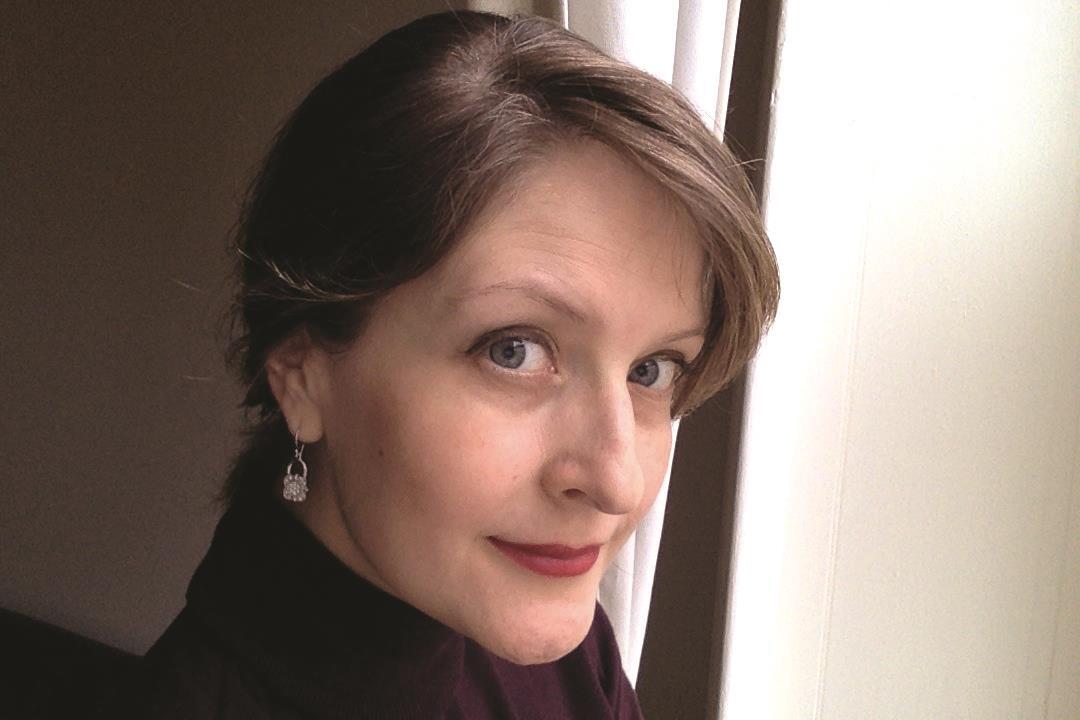 Raised in the Midwest, Greer Macallister is a poet, short story writer and playwright. Her plays have been performed at American University, where she earned her MFA in Creative Writing. Her debut novel is The Magician's Lie (Sourcebooks, January 13, 2015). Macallister lives with her family on the East Coast.
Raised in the Midwest, Greer Macallister is a poet, short story writer and playwright. Her plays have been performed at American University, where she earned her MFA in Creative Writing. Her debut novel is The Magician's Lie (Sourcebooks, January 13, 2015). Macallister lives with her family on the East Coast.
On your nightstand now:
I'm always playing catch-up with things that have been out for a while, so right now it's these: The Prestige by Christopher Priest, The Autobiography of Mrs. Tom Thumb by Melanie Benjamin and Station Eleven by Emily St. John Mandel (yes, I'm the last one to get to it). I'm hoping to be ahead of the game with Rodin's Lover by Heather Webb, which comes out [late January 2015]. Also on my literal physical nightstand is my toddler son's copy of the Richard Scarry classic What Do People Do All Day? We've read it approximately 283 times so far.
Favorite book when you were a child:
I was a rabid Madeleine L'Engle fan girl in my youth, and that all started with A Wrinkle in Time. It was just so eye opening and inventive and stunningly rich with possibilities. Plus, some part of me will always have a thing for Calvin O'Keefe.
Your top five authors:
They're all over the place, but they all blow me away: Margaret Atwood, Barbara Kingsolver, Jane Austen, Neal Stephenson, Ross Macdonald.
Book you've faked reading:
I used to be the one who read every single book for my book club, cover to cover, but at one point my club picked John Grogan's Marley & Me, and I just didn't get around to reading it before the meeting. Between the snacks and the wine and the people with strong feelings about dogs, I managed to just not say anything and no one called me on it. Phew!
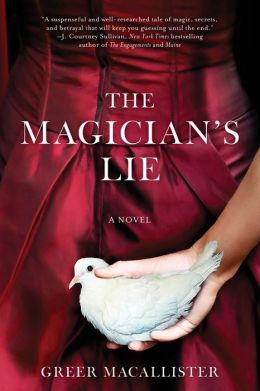
Depending on the reader--because really, is there any book that's perfect for all readers at all times?--I'll advocate for one of three novels I love. Want an amazing example of historical fiction that creates a rich, three-dimensional world to disappear into? The Signature of All Things by Elizabeth Gilbert. A smart, funny, emotional contemporary read? Allie Larkin's Stay. Something dark and resonant that explores mother-son relationships, loss and the nature of fiction itself? Carolyn Parkhurst's The Nobodies Album.
Book you've bought for the cover:
Before We Met by Lucie Whitehouse. It's not the only exploding-flower cover of the past few years, but it's my favorite of the bunch.
Book that changed your life:
P.S. I Love You--not the Cecelia Ahern one, but the first in the Sweet Dreams series of teen romances by Barbara Conklin. As a reader, I devoured that whole line of books at my local library, and as a writer, it was the first book I tried to emulate. In fourth grade I wrote an eight-page "novel" that was pretty much just a direct copy of the plot of that book. My style has changed a lot and I've certainly gotten more original, but the passion for writing remains the same.
Favorite line from a book:
"I planned my death carefully; unlike my life, which meandered along from one thing to another, despite my feeble attempts to control it." It's the first line of Margaret Atwood's Lady Oracle, and I seriously have been waiting for years for someone to ask me this. Thank you!
Which character you most relate to:
Oh gosh, none of the characters in the books I enjoy are as boring as I am in real life. I want to read about people who are bolder and meaner and brighter and less lucky than I am. For example, I can't really relate to any of the girls in The Poisonwood Bible by Barbara Kingsolver, but I love every last one of them to pieces.
Book you most want to read again for the first time:
Alias Grace (Margaret Atwood, again) is one of the most perfect novels it's been my pleasure to read. The elegant language, the intriguing plot, the balance between secrecy and revelation--everything falls into place.
See How Small by Scott Blackwood (Little, Brown, $25 hardcover, 9780316373807, January 20, 2015)
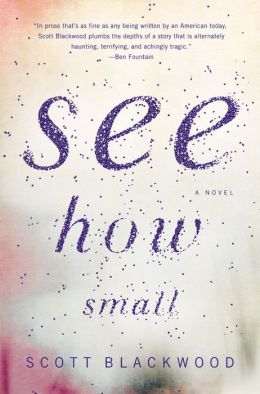
In short chapters, Blackwood's narrative moves among the characters' stories (past, present and future), exposing their personal struggles independent of the tragedy and at the same time revealing clues to the events that led to the robbery. Kate, owner of the store and mother of two of the victims, retreats from her grief into affairs as her estranged husband flounders in his own business. Jack is the fireman who fights through the flames to find the girls too late to save them. Michael, the getaway driver, is too hopped up on pills and weed at the scene of the crime to understand how much trouble he's in. Rosa is a local news reporter still digging for answers several years later, even though she knows that "some stories don't have an ending even if you want them to." Hollis, a PTSD-impaired Iraq War vet, lived in his elaborately decked-out "art car," which was in the ice-cream shop parking lot at the time of the robbery. Some years after the tragedy, Truck and Trailer, a couple of homeless buddies of Hollis, ramble on about phantom missionaries and encourage his delusions. In a kind of Greek chorus, even the dead girls provide commentary on their pasts and imagined futures.
Blackwood's language rarely misses--whether describing the unstable Hollis, who "can't find the mental thread on which to string the everyday beads of life," or Jack's teen daughter's boyfriend, who "smells pungently like bong smoke and carries around a little tackle box of harmonicas in different keys and can't play a lick." Five years after the crime, Kate and Jack become a tenuous couple, Michael's downward spiral into drugs finds him raiding his stepmother's medicine cabinet and Hollis turns into an even more unhinged oracle. It is no small feat to make all this work, but Blackwood so successfully weaves together these disparate strands that See How Small turns into a rich tapestry of human failing and hopeful striving. --Bruce Jacobs, founding partner, Watermark Books & Cafe, Wichita, Kan.
Shelf Talker: ScottBlackwood's second novel deftly explores the aftermath of a brutal crime and the ways violence damages the already fragile lives of a community.
Many of my favorite bookseller stories begin, "There was this customer who...." Here's one: There was this customer who regularly came into Manchester's Northshire Bookstore looking for fiction recommendations, and for a brief period took some of mine. She was a brusque, intense New Jersey lawyer who owned a weekend getaway place in Vermont. "I liked this one," I'd say, launching into my 25-words-or-less bookish moment of passionate intensity. Then she'd lock her steely, cross-examination courtroom eyes on mine and demand, "Well, did you like it or did you love it?"
Though I managed a few successful handsells, she quickly discovered that her reading tastes were more closely aligned with those of Louise Jones, a colleague of mine the lawyer was also consulting about great reads. It was only a matter of time before the attorney acted in the decisive manner you would expect, and even though we continued our friendly bookish banter for years, Louise became her handseller of choice.
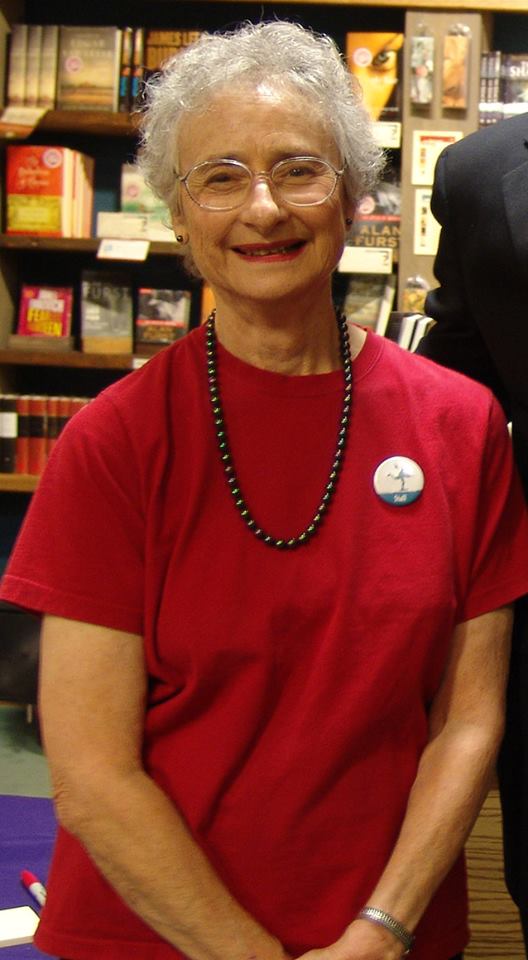 |
|
| Louise Jones (photo: Mary Allen) |
|
I was thinking about that customer Tuesday night when I returned to the Northshire for a party celebrating Louise's retirement after more than 30 years as a bookseller. In addition to current and former staff members, the guests included many longtime customers for whom Louise has played an important role--equal parts friend and reading guru.
In the bookstore's e-newsletter recently, Northshire co-owner Chris Morrow observed: "As many of you know, Louise's specialty was mystery books. She has turned generations of visitors on to the latest mysteries--whether mainstream or obscure. But Louise's impact is much broader than that. She helped train countless booksellers in the art of master bookselling, she wrote and edited many of our newsletters, and she steadfastly advocated for excellence. Please join me in thanking Louise for her dedication to the bookstore and the community for these many years."
Hired by the Northshire in the spring of 1992, I was one of the countless booksellers Louise trained. During my interview process, someone explained the absurd concept that customers would expect, even demand, book recommendations from me. As a customer at many bookshops, I had never asked for such a thing and wondered why anyone would want to know what I liked to read. Fortunately, I kept those reservations to myself and was hired.
How, then, did I make the substantial transition from skeptic to passionate handseller so quickly? I watched and learned and emulated. From day one, I saw how Louise turned conversations into sales without pushing; how she condensed the essence of a book into an irresistible paragraph; how she could handsell a suspense novel, cookbook, historical biography or book about fishing with equal adeptness (and sometimes to the same customer); and how she moved across the sales floor taking care of business while always being available for customer interaction. I learned that bookselling was not just a retail job. It could be a vocation, even an art. 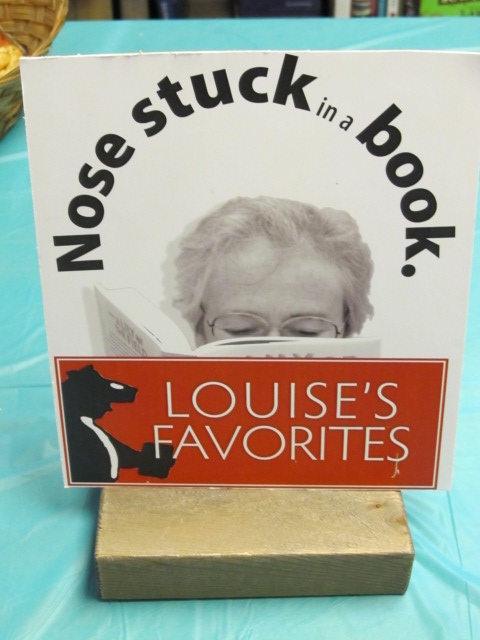 During Louise's retirement party, Ed Morrow, co-founder (with Barbara) of the Northshire, said, "A bookstore is really a culture and a society of like-minded people. Louise has been an example right from the start of the epitome of bookselling. She helped the bookstore to grow and to create a culture."
During Louise's retirement party, Ed Morrow, co-founder (with Barbara) of the Northshire, said, "A bookstore is really a culture and a society of like-minded people. Louise has been an example right from the start of the epitome of bookselling. She helped the bookstore to grow and to create a culture."
Observing her, I learned the cultural value of being a great frontline bookseller. Gradually, I also came to realize that when the book trade used the term "bookseller," they were most often referring to bookstore owners rather than staff. In 2004, I launched a blog called Fresh Eyes: A Bookseller's Journal in part to showcase the important role frontline booksellers like Louise play in the business, particularly since they are usually the only direct point of contact the book-buying public has with the publishing industry.
I think perceptions have changed in recent years, with the growth of social media interaction among booksellers and more publisher awareness, as well as the creation of venues like ABA's Winter Institute. Still, it is often headline news in local newspapers and industry trade publications when bookstore owners sell or close their shops, while the retirement of a gifted frontline bookseller, which can also have significant community impact, receives less attention.
Louise is one of those gifted booksellers and she will be missed. Former publisher sales rep Bill Andrews, who called on the Northshire for many years, summed it up nicely in a Facebook comment: "I guess all good things must end. Congratulations Louise! You are without doubt one of the absolute best booksellers I have ever seen, a true pro in every way, and as nice as they come. Thank you for the many kindnesses you have shown me down through the years. Enjoy the party--such a classy move--and enjoy all those fantastic books that await you in retirement. You are fantastic!!" And she is. Happy retirement, Louise. --Robert Gray, contributing editor (column archives available at Fresh Eyes Now)